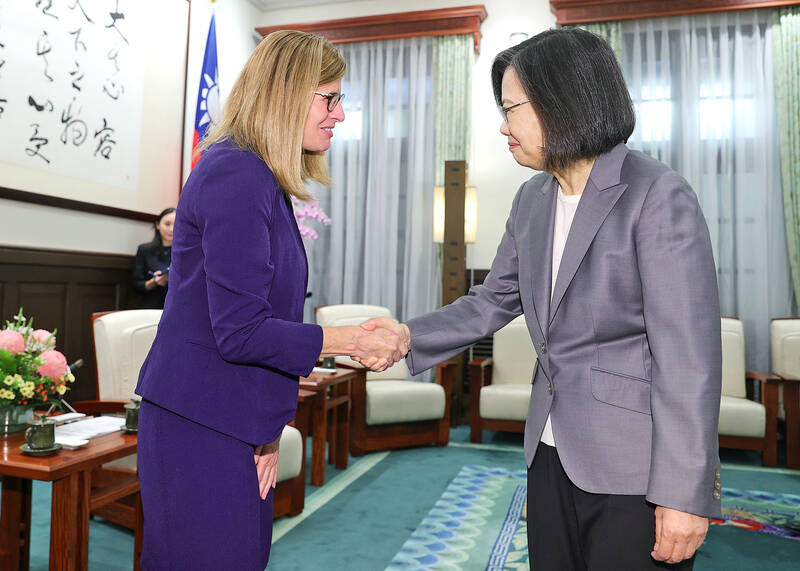Minister of Economic Affairs Wang Mei-hua (王美花) and US National Institute of Standards and Technology (NIST) Director Laurie Locascio on Tuesday agreed to increase cybersecurity collaboration between the two countries, a Ministry of Economic Affairs official who is familiar with the matter said.
Wang and Locascio agreed at a meeting in Taipei to build up a joint cybersecurity supply chain under the US-Taiwan Technology Trade and Investment Collaboration (TTIC) framework, the official said.
The TTIC, established in December 2021, is a bilateral cooperation framework that aims to facilitate the development of joint commercial programs and bolster critical technology supply chains.

Photo: CNA
Initial areas of focus include semiconductors, 5G, electric vehicles, sustainable energy and cybersecurity.
The official said that many US information technology companies use Taiwan-produced hardware, and that the US hopes the nation would be able to manufacture advanced servers and 5G mobile networks to enhance cybersecurity.
Both countries could enjoy economic benefits from further cybersecurity cooperation, the official said.
Also on Tuesday, Locascio said at the opening ceremony of a US Business Day forum that the US was drafting a new version of the NIST Cybersecurity Framework, which it hoped to launch next year.
She said she hopes to discuss collaboration opportunities with Taiwan, for example to protect customer data privacy.
Many US start-ups are on the hunt for partners with expertise in cybersecurity, she said.
Locascio led a cybersecurity business development mission in Taiwan from Monday to yesterday, which introduced 13 US firms to some of Taiwan’s leading information and communication technology security, and critical infrastructure protection markets.
The delegation met with President Tsai Ing-wen (蔡英文), and visited the National Science and Technology Council and the Ministry of Digital Affairs to exchange ideas relating to cybersecurity and semiconductors, the NIST said.

Taiwan Semiconductor Manufacturing Co (TSMC, 台積電) would not produce its most advanced technologies in the US next year, Minister of Economic Affairs J.W. Kuo (郭智輝) said yesterday. Kuo made the comment during an appearance at the legislature, hours after the chipmaker announced that it would invest an additional US$100 billion to expand its manufacturing operations in the US. Asked by Taiwan People’s Party Legislator-at-large Chang Chi-kai (張啟楷) if TSMC would allow its most advanced technologies, the yet-to-be-released 2-nanometer and 1.6-nanometer processes, to go to the US in the near term, Kuo denied it. TSMC recently opened its first US factory, which produces 4-nanometer

GREAT SUCCESS: Republican Senator Todd Young expressed surprise at Trump’s comments and said he expects the administration to keep the program running US lawmakers who helped secure billions of dollars in subsidies for domestic semiconductor manufacturing rejected US President Donald Trump’s call to revoke the 2022 CHIPS and Science Act, signaling that any repeal effort in the US Congress would fall short. US Senate Minority Leader Chuck Schumer, who negotiated the law, on Wednesday said that Trump’s demand would fail, while a top Republican proponent, US Senator Todd Young, expressed surprise at the president’s comments and said he expects the administration to keep the program running. The CHIPS Act is “essential for America leading the world in tech, leading the world in AI [artificial

REACTIONS: While most analysts were positive about TSMC’s investment, one said the US expansion could disrupt the company’s supply-demand balance Taiwan Semiconductor Manufacturing Co’s (TSMC, 台積電) new US$100 billion investment in the US would exert a positive effect on the chipmaker’s revenue in the medium term on the back of booming artificial intelligence (AI) chip demand from US chip designers, an International Data Corp (IDC) analyst said yesterday. “This is good for TSMC in terms of business expansion, as its major clients for advanced chips are US chip designers,” IDC senior semiconductor research manager Galen Zeng (曾冠瑋) said by telephone yesterday. “Besides, those US companies all consider supply chain resilience a business imperative,” Zeng said. That meant local supply would

Servers that might contain artificial intelligence (AI)-powering Nvidia Corp chips shipped from the US to Singapore ended up in Malaysia, but their actual final destination remains a mystery, Singaporean Minister for Home Affairs and Law K Shanmugam said yesterday. The US is cracking down on exports of advanced semiconductors to China, seeking to retain a competitive edge over the technology. However, Bloomberg News reported in late January that US officials were probing whether Chinese AI firm DeepSeek (深度求索) bought advanced Nvidia semiconductors through third parties in Singapore, skirting Washington’s restrictions. Shanmugam said the route of the chips emerged in the course of an